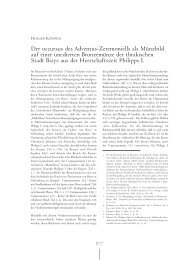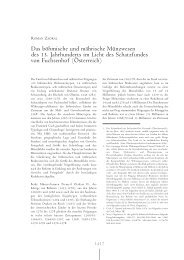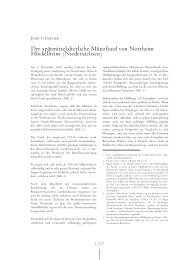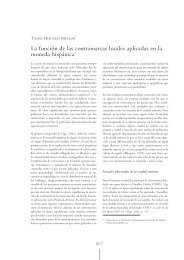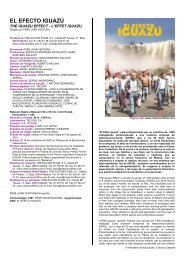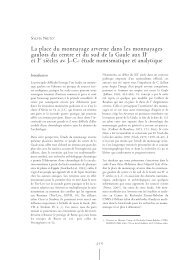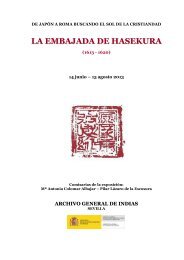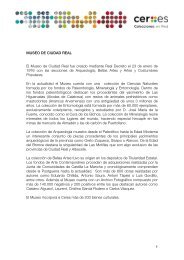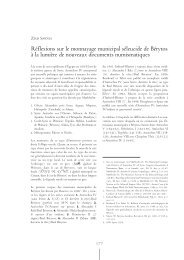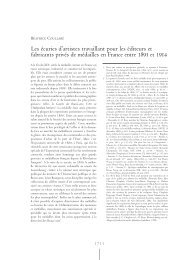La Ley de Memoria Histórica: reparación e insatisfacción Julio ...
La Ley de Memoria Histórica: reparación e insatisfacción Julio ...
La Ley de Memoria Histórica: reparación e insatisfacción Julio ...
Create successful ePaper yourself
Turn your PDF publications into a flip-book with our unique Google optimized e-Paper software.
<strong>de</strong> ver formulados muchos <strong>de</strong> ellos en el propio trámite <strong>de</strong> p<strong>reparación</strong>, discusión y final aprobación <strong>de</strong><br />
esa disposición en las Cortes. Pero no son tales reparos nuestro objetivo aquí, sino la consi<strong>de</strong>ración <strong>de</strong><br />
las circunstancias que <strong>de</strong>s<strong>de</strong> el punto <strong>de</strong> vista histórico, memorial, moral y político han acompañado la<br />
andadura <strong>de</strong> una discutida disposición hoy en vigor. Una <strong>Ley</strong> <strong>de</strong> este género tiene, inevitablemente,<br />
zonas <strong>de</strong> confrontación con y entre realida<strong>de</strong>s ineludibles como son la Historia reciente <strong>de</strong>l país y las<br />
manifestaciones <strong>de</strong> la <strong>Memoria</strong> colectiva, siempre dispersas éstas últimas e, inevitablemente también,<br />
contradictorias. <strong>La</strong> <strong>reparación</strong> moral y memorial <strong>de</strong> las <strong>de</strong>rivaciones jurídicas e históricas <strong>de</strong> la represión<br />
dictatorial, así como sus transcripciones en el terreno penal –en la guerra y posguerra– enteramente<br />
enfrentadas a lo que prescribe el <strong>de</strong>recho <strong>de</strong> países <strong>de</strong>mocráticos, no es, <strong>de</strong>s<strong>de</strong> luego, un empeño fácil.<br />
En consecuencia, ninguna consi<strong>de</strong>ración sobre la <strong>Ley</strong> pue<strong>de</strong> hacerse olvidando el contexto in<strong>de</strong>fectiblemente<br />
“histórico” en que se toman las <strong>de</strong>cisiones que marcan la trayectoria <strong>de</strong> una sociedad, en el que<br />
se hacen las leyes. <strong>La</strong> ignorancia, culpable o inconsciente, <strong>de</strong> esa obligatoria contextualización histórica<br />
en la que muchas opiniones y posiciones han caído nos ha procurado hasta hoy no pocos dislates, privados<br />
y públicos, en el enjuiciamiento ajustado <strong>de</strong> lo que la disposición legal contiene.<br />
Puesto que se trata <strong>de</strong> enjuiciar una <strong>Ley</strong> en vigor, no serían ociosas unas breves consi<strong>de</strong>raciones sobre<br />
el proceso <strong>de</strong> su elaboración y aprobación tanto como un comentario sobre su contenido. Es bien sabido<br />
que la elaboración <strong>de</strong>l texto fue encomendada a una comisión ministerial, cuya actuación comenzó muy<br />
pronto en la legislatura <strong>de</strong> 2004, y que su redacción comenzó por la elaboración <strong>de</strong> un anteproyecto que,<br />
en <strong>de</strong>finitiva, experimentó alteraciones <strong>de</strong> cierta importancia antes <strong>de</strong> verse convertido en la <strong>Ley</strong> misma.<br />
Sustancialmente, el texto aprobado, que se dispone en veintidós artículos, ocho disposiciones adicionales,<br />
una <strong>de</strong>rogatoria y dos finales, a<strong>de</strong>más <strong>de</strong> un Preámbulo <strong>de</strong> gran interés, se dirige a la restitución <strong>de</strong> la<br />
memoria personal <strong>de</strong> víctimas inocentes y a la in<strong>de</strong>mnización, parcial y condicionada, <strong>de</strong> daños reconocidos<br />
en personas y patrimonios, así como a dar un <strong>de</strong>stino ajustado a las huellas materiales y simbólicas<br />
<strong>de</strong>l conflicto y <strong>de</strong>l periodo dictatorial.<br />
<strong>La</strong> <strong>Ley</strong>, pues, pue<strong>de</strong> consi<strong>de</strong>rarse que afecta a cuatro gran<strong>de</strong>s cuestiones relacionadas con la <strong>reparación</strong><br />
<strong>de</strong> las víctimas <strong>de</strong> un pasado traumático con bandos enfrentados que han tenido hasta finales <strong>de</strong>l siglo<br />
XX un tratamiento bastante disimétrico según hubiese sido, precisamente, el bando en que se militó. Es<br />
THE HISTORICAL MEMORY LAW: REPARITION AND<br />
DISSATISFACTION<br />
<strong>Julio</strong> Aróstegui<br />
Contemporary History Chairman of Complutense University<br />
of Madrid. Director of the Extraordinary Chair “Historical<br />
Memory of the 20th Century”<br />
That a country, searching for its <strong>de</strong>finitive mo<strong>de</strong>rnity<br />
and for the consolidation of a <strong>de</strong>mocracy<br />
reestablished after a long dictatorship, tries and<br />
manages to settle the score with a recent past of conflicts<br />
and internal armed battles through a specific and<br />
global, <strong>La</strong>w doesn’t cease to be an unusual historic event<br />
and politically and socially of unquestionable relevance.<br />
What has begun in Spain, at the very beginning of a new<br />
century, one which leaves behind the most conflictive<br />
century of its contemporary history, the 20th, is a process<br />
of mo<strong>de</strong>rnity, justice, and <strong>de</strong>mocracy, in passing a <strong>La</strong>w<br />
(<strong>Ley</strong> 52/2007, of December 26) “by which the rights are<br />
recognized and augmented and measures established in<br />
favor of those who suffered persecution or violence during<br />
the Civil War and the Dictatorship”. That is to say,<br />
what is commonly known as the Historical Memory <strong>La</strong>w.<br />
An act which closes a long dark period in the civil<br />
(though not in the scientific or historiographic) consi<strong>de</strong>ration<br />
of the disasters of our most recent past.<br />
Nonetheless, this legal disposition has not satisfied a<br />
large sector of the public opinion nor of the social and<br />
politically active forces. It is necessary that we explain<br />
this phenomenon and that we make an effort to clarify<br />
and un<strong>de</strong>rstand the reach of what has been achieved.<br />
Other countries which lived firsthand, with their own viscera,<br />
the great armed catastrophes of the 20th Century,<br />
already ma<strong>de</strong> this reconciliation with the past much<br />
sooner, through more normal judiciary and political<br />
channels which followed quickly on the heels of the acts<br />
themselves: successive and pragmatic dispositions<br />
passed with a higher and more-direct <strong>de</strong>gree of social<br />
consensus than our own. In Spain, well-known weighty<br />
historic reasons impe<strong>de</strong>d during <strong>de</strong>ca<strong>de</strong>s (after that crucial<br />
<strong>de</strong>ca<strong>de</strong> of the 1930s) the <strong>de</strong>finitive reparation of the<br />
past tragedies, above all, in what these represented as a<br />
<strong>de</strong>bt needing to be repaid: the reparation of the victims,<br />
innocent by <strong>de</strong>finition, which these violent confrontations<br />
have produced. The existence of a civil war with the connotations<br />
of the Spanish one of 1936-1939, its result in a prolonged<br />
Dictatorship by the victors, the continuation of the<br />
same Civil War through repressive mechanisms of every<br />
sort, have placed the country, for over a third of a century,<br />
in an exceptional situation in terms of this need for a just<br />
reparation of the mistakes of the past.<br />
In terms of what the cited <strong>La</strong>w contains specifically<br />
about the respective dimensions of the reparation to be<br />
43



